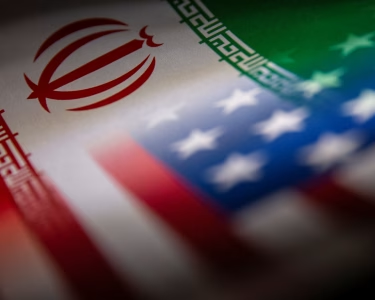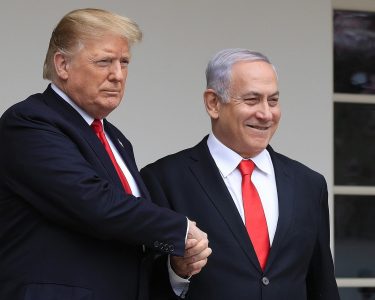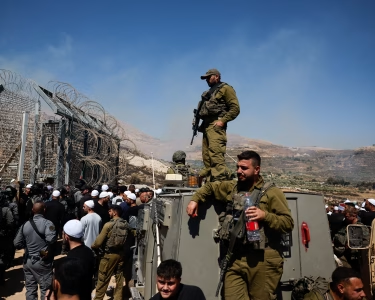Summary
- Aleppo assault is biggest challenge to Assad in years.
- Russia conducts strikes in support of the Syrian army.
- Russian and Turkish foreign ministers discuss the escalating situation.
- Rebels say they control Aleppo airport.
- Airstrikes reported in Aleppo after army vows to counterattack.
AMMAN, Jordan, Nov 30 (AfrikTimes) – The Syrian army said on Saturday that dozens of its soldiers had been killed in a major attack led by the Islamist group Hayat Tahrir al-Sham (HTS), which seized control of parts of Aleppo in what is being described as the biggest challenge to President Bashar al-Assad in years.
Russia’s Defense Ministry said its air force had carried out strikes on Syrian rebels in support of the country’s army, Russian news agencies reported. The strikes followed what was the boldest rebel assault for years in a civil war where front lines had largely been stagnant since 2020.
Hayat Tahrir al-Sham, or HTS, formerly known as the Nusra Front, is designated as a terrorist organization by the U.S., Russia, Turkey, and other states. Assad, a key ally of Moscow, now faces a renewed threat as HTS fighters pushed into Aleppo. A spokesperson for the U.S. State Department said earlier that the United States is monitoring the situation.
The war, which has killed hundreds of thousands of people and displaced many millions, has ground on since 2011 with no formal end, although most major fighting halted years ago after Iran and Russia helped Assad’s government win control of most land and all major cities.
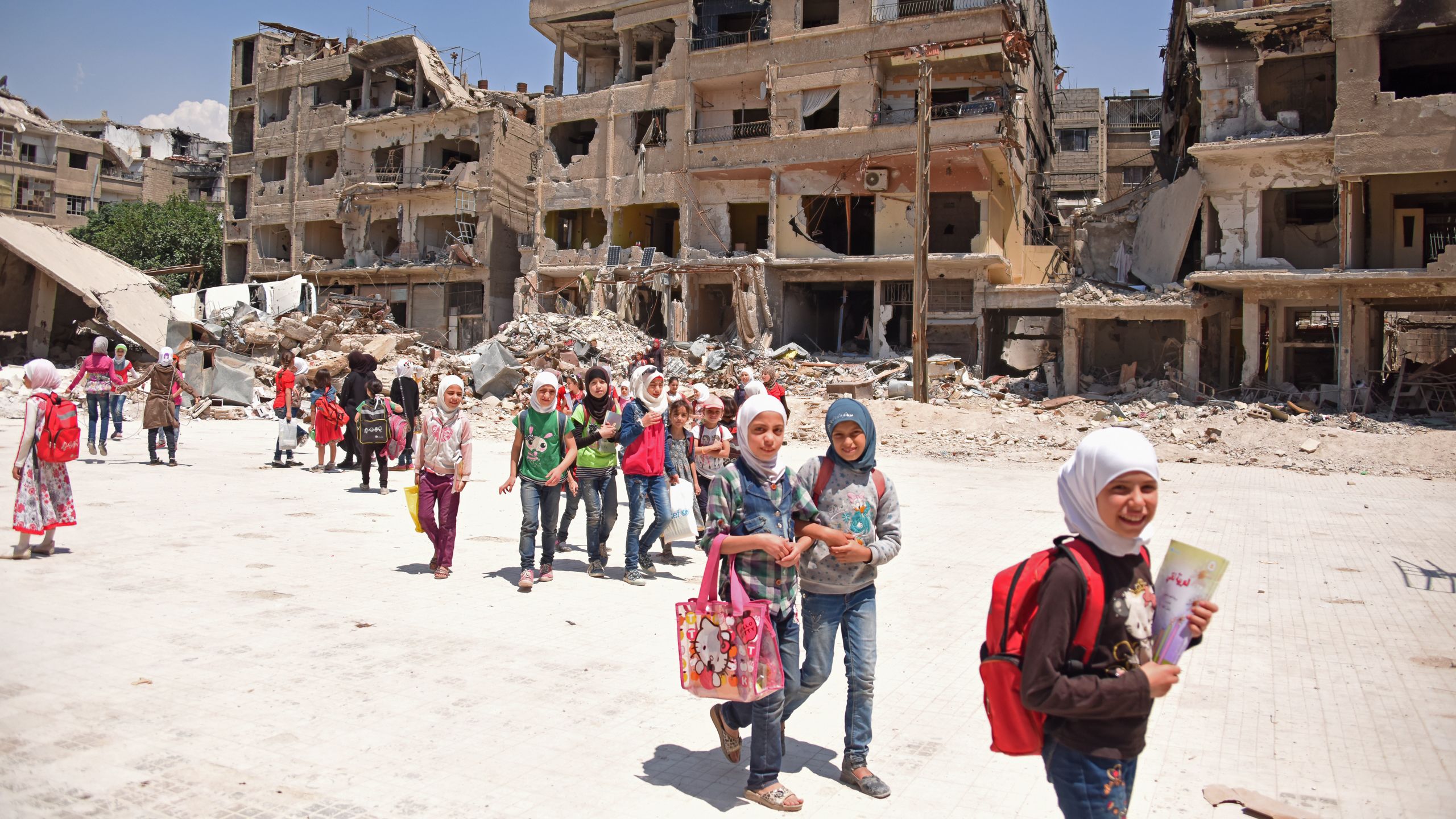 Children living in Harasta, Eastern Ghouta, flock to school to catch up on years of missed education.
Children living in Harasta, Eastern Ghouta, flock to school to catch up on years of missed education.
Aleppo had been firmly held by the government since a 2016 victory there, one of the war’s major turning points, when Russian-backed Syrian forces besieged and laid waste to rebel-held eastern areas of what had been the country’s largest city. “I am a son of Aleppo, and was displaced from it eight years ago, in 2016. Thank God we just returned. It is an indescribable feeling,” said Ali Jumaa, a rebel fighter, in television footage filmed inside the city.
Acknowledging the rebel advance, the Syrian army command said insurgents had entered much of Aleppo. After the army said it was preparing a counterattack, airstrikes targeted rebel gatherings and convoys in the city, the pro-Damascus newspaper al-Watan reported. One strike caused casualties in Aleppo’s Basel square; a resident told reporters.
The state-run Russian Centre for the Reconciliation of the Enemy Parties in Syria said missile and bomb strikes against the rebels had targeted “militant concentrations, command posts, depots, and artillery positions” in Aleppo and Idlib provinces. It claimed that about 300 rebel fighters were killed in the attacks.
Overnight, images from Aleppo showed a group of rebel fighters gathered in the city’s Saadallah al-Jabiri Square, with a billboard of Assad looming behind them. Images filmed on Saturday showed people posing for photos on a toppled statue of Bassil al-Assad, late brother of the president. Fighters zipped around the city in trucks and milled around in the streets. A man waved a Syrian opposition flag as he stood near Aleppo’s historic citadel.
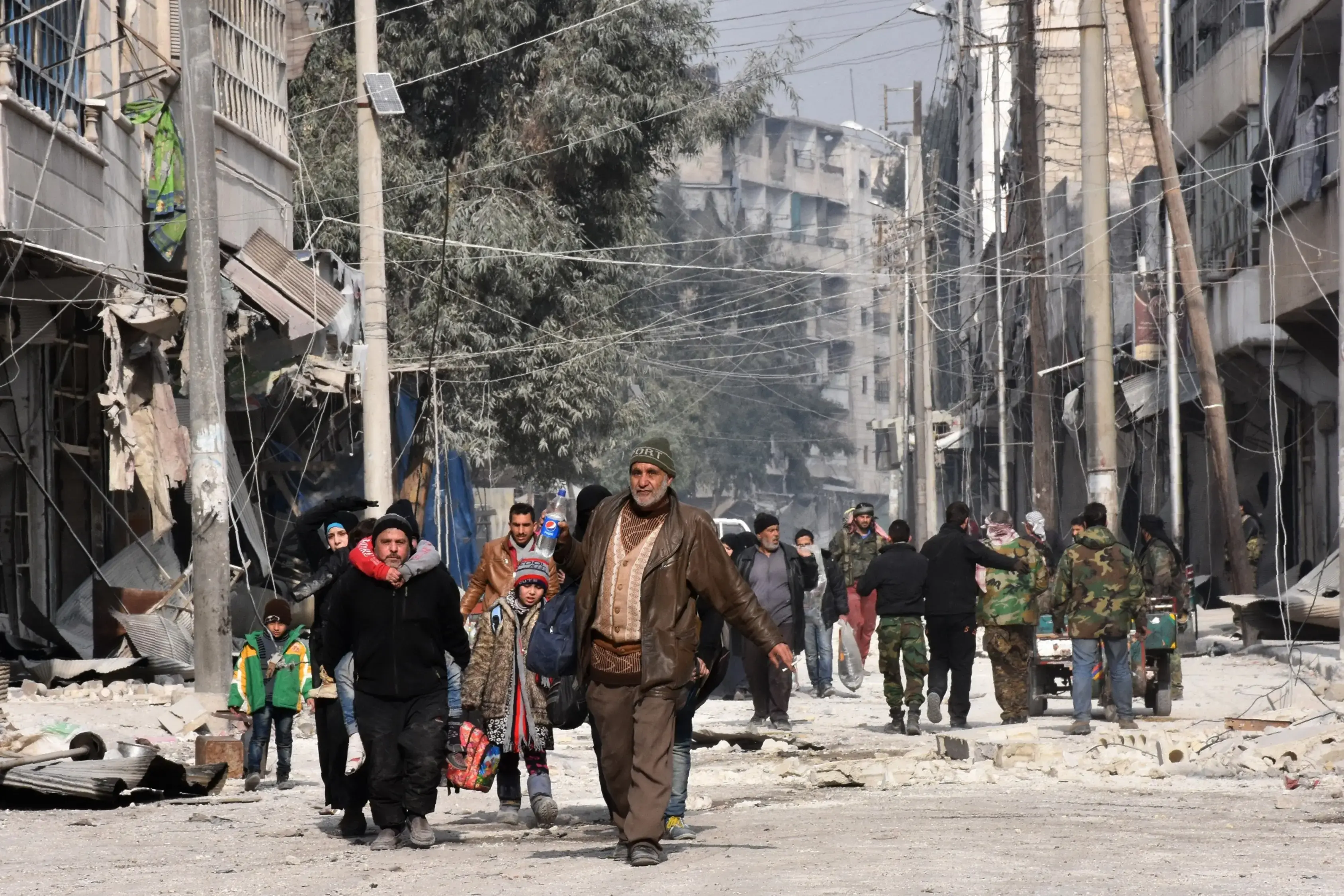 Residents flee the al-Salihin neighborhood in east Aleppo after regime troops retook the area in December 2016.
Residents flee the al-Salihin neighborhood in east Aleppo after regime troops retook the area in December 2016.
The Syrian military command said militants had attacked in large numbers and from multiple directions, prompting “our armed forces to carry out a redeployment operation aimed at strengthening the defense lines in order to absorb the attack, preserve the lives of civilians and soldiers”.
The rebels also took control of Aleppo airport, according to a statement from their operations room and a security source. Two rebel sources also said the insurgents had captured the city of Maraat al Numan in Idlib province, bringing all of that area under their control.
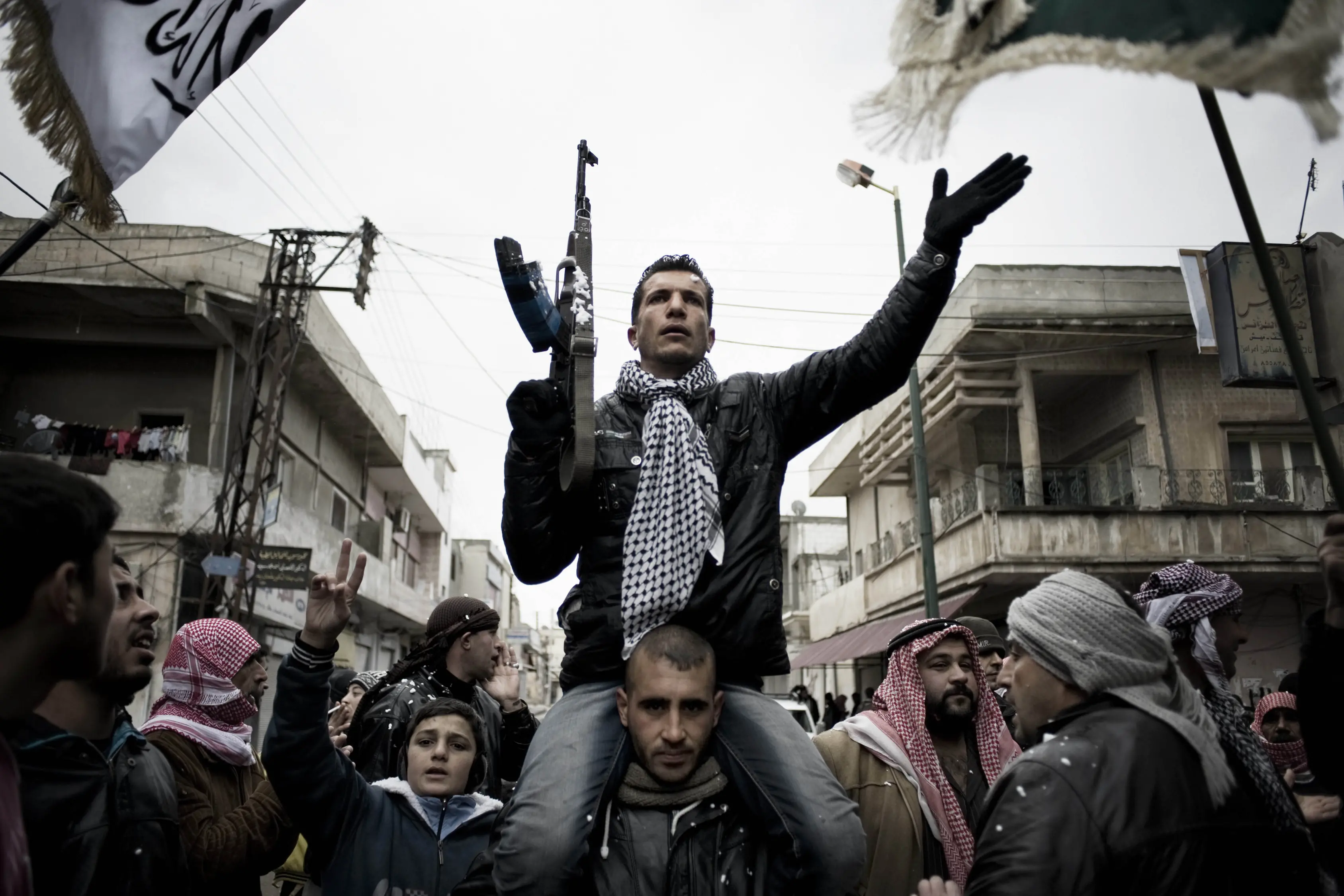 People demonstrate against the Assad regime in the besieged town of Al Qsair, near Homs, in January 2012.
People demonstrate against the Assad regime in the besieged town of Al Qsair, near Homs, in January 2012.
With Assad backed by Russia and Iran, and Turkey supporting some of the rebels in the northwest where it maintains troops, the offensive has brought into focus the conflict’s knotted geopolitics. Fighting in the northwest had largely abated since Turkey and Russia reached a de-escalation agreement in 2020.
 A car is parked near a ripped poster of Syria’s President Bashar al-Assad, after rebels opposed to President Bashar al-Assad said they had reached the heart of Aleppo, Syria November 30, 2024.
A car is parked near a ripped poster of Syria’s President Bashar al-Assad, after rebels opposed to President Bashar al-Assad said they had reached the heart of Aleppo, Syria November 30, 2024.
RUSSIAN, TURKISH MINISTERS TALK
Russian Foreign Minister Sergei Lavrov held a phone call with his Turkish counterpart, Hakan Fidan, discussing the situation in Syria, Russia’s Foreign Ministry said on Saturday. “Both sides expressed serious concerns at the dangerous development of the situation,” the ministry said. They agreed it was necessary to coordinate joint actions to stabilize the situation in the country.
Turkish security officials had said on Thursday that Ankara had prevented operations which opposition groups wanted to organize, in order to avoid further tensions in the region. Iranian Foreign Minister Abbas Araqchi told Lavrov in a phone call that the rebel attacks were part of an Israeli-U.S. plan to destabilize the region, Iranian state media said.
The Syrian Civil Defense, a rescue service operating in opposition-held parts of Syria, said in a post on X that Syrian government and Russian aircraft carried out airstrikes on residential neighborhoods in rebel-held Idlib, killing four civilians and wounding six others. Two Syrian military sources said Russia has promised Damascus extra military aid that would start arriving in the next 72 hours.
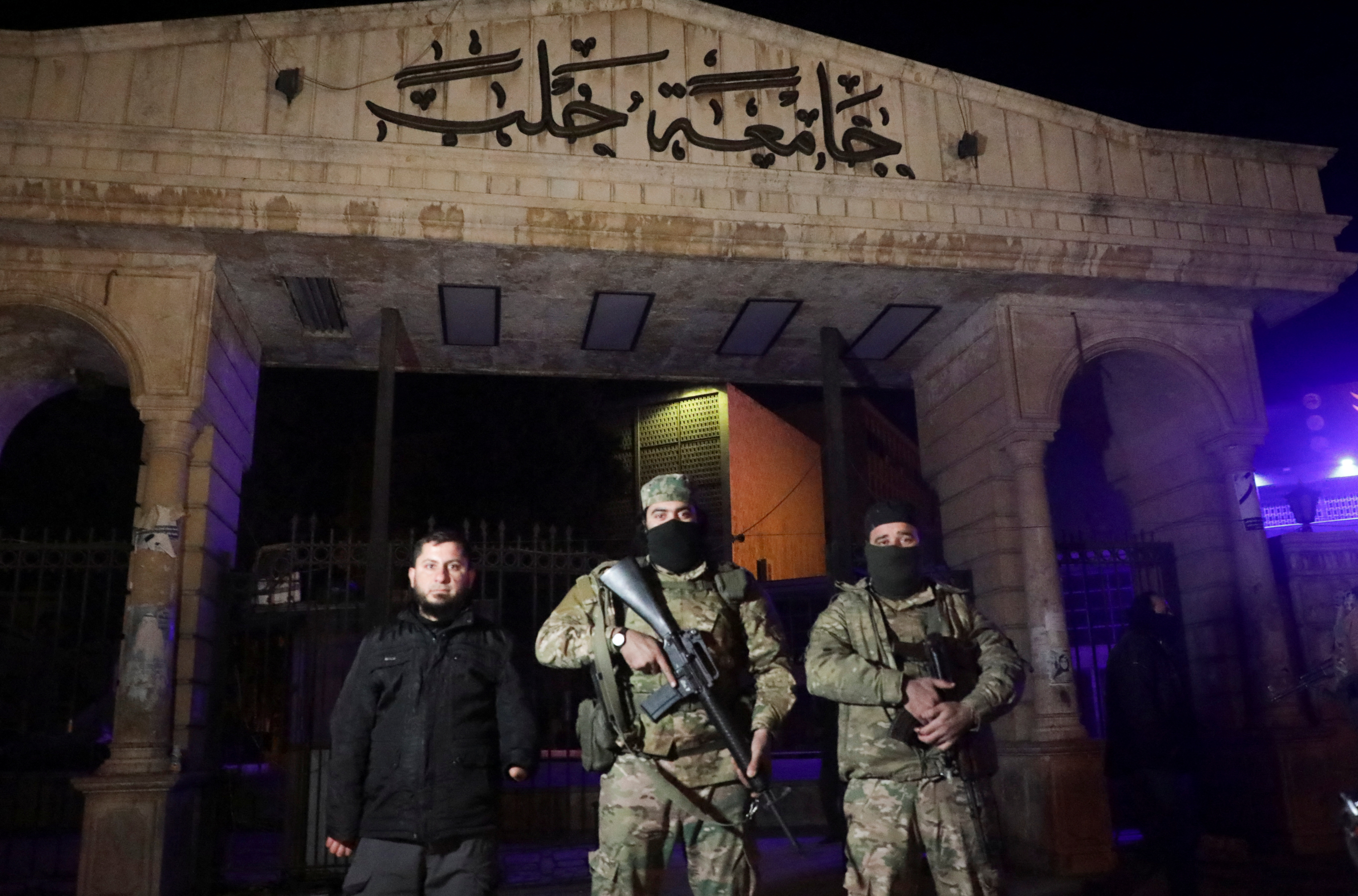 Syrian opposition fighters stand in front of University of Aleppo, after rebels opposed to Syria’s President Bashar al-Assad said they had reached the heart of Aleppo, Syria November 30, 2024.
Syrian opposition fighters stand in front of University of Aleppo, after rebels opposed to Syria’s President Bashar al-Assad said they had reached the heart of Aleppo, Syria November 30, 2024.
The Kurdish People’s Protection Units (YPG), which spearhead the U.S.-backed Syrian Democratic Forces that control much of northeastern and eastern Syria and have long had a foothold in Aleppo, widened their control in the city as government troops left, a senior YPG source said. Mustafa Abdul Jaber, a commander in the Jaish al-Izza rebel brigade, said the rebels’ speedy advance had been helped by a lack of Iran-backed manpower to support the government in the broader Aleppo province. Iran’s allies in the region have suffered a series of blows at the hands of Israel as the Gaza war has expanded through the Middle East.
The opposition fighters have said the campaign was in response to stepped-up strikes in recent weeks against civilians by the Russian and Syrian air forces on areas of Idlib province, and to preempt any attacks by the Syrian army.


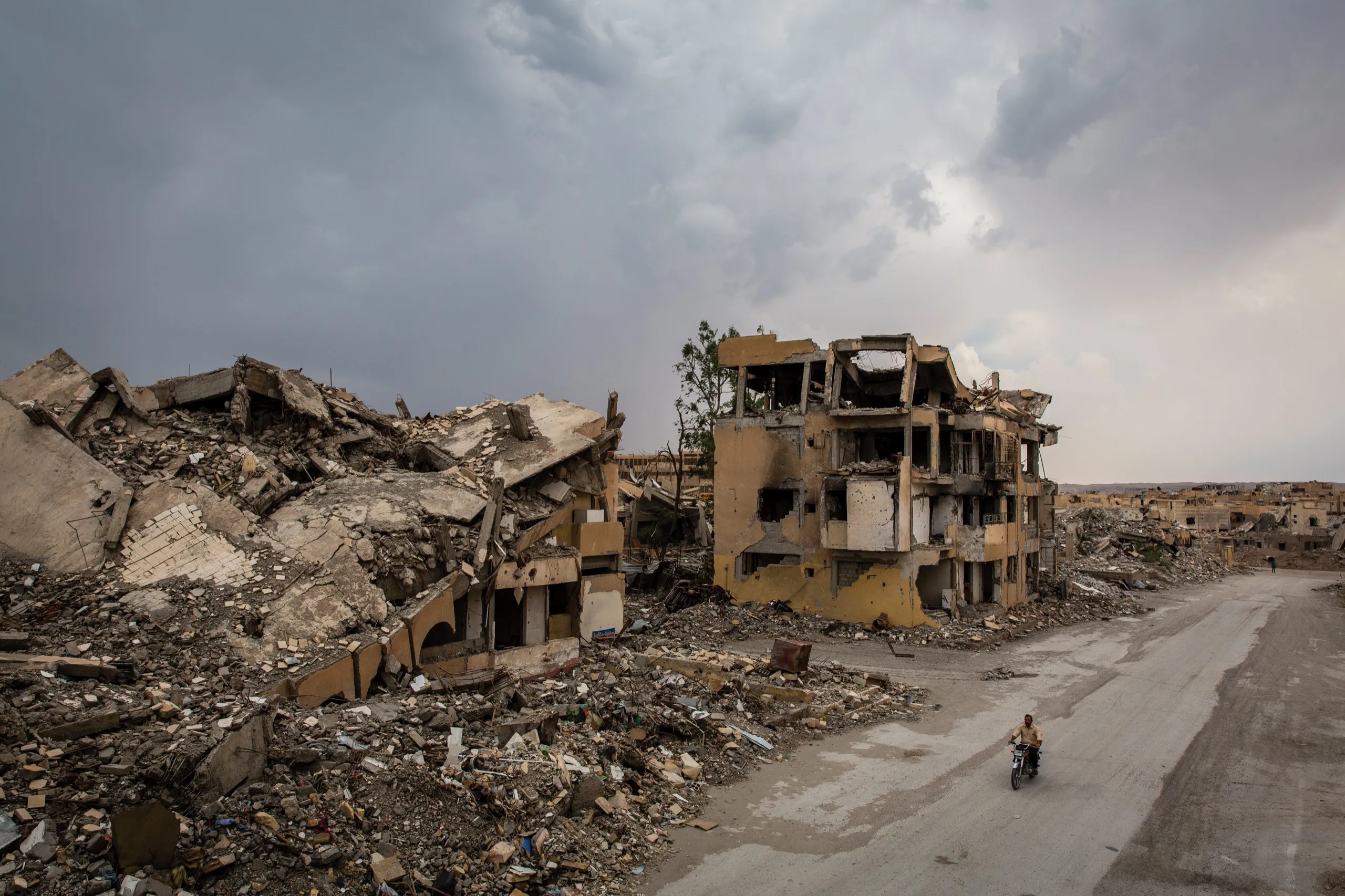

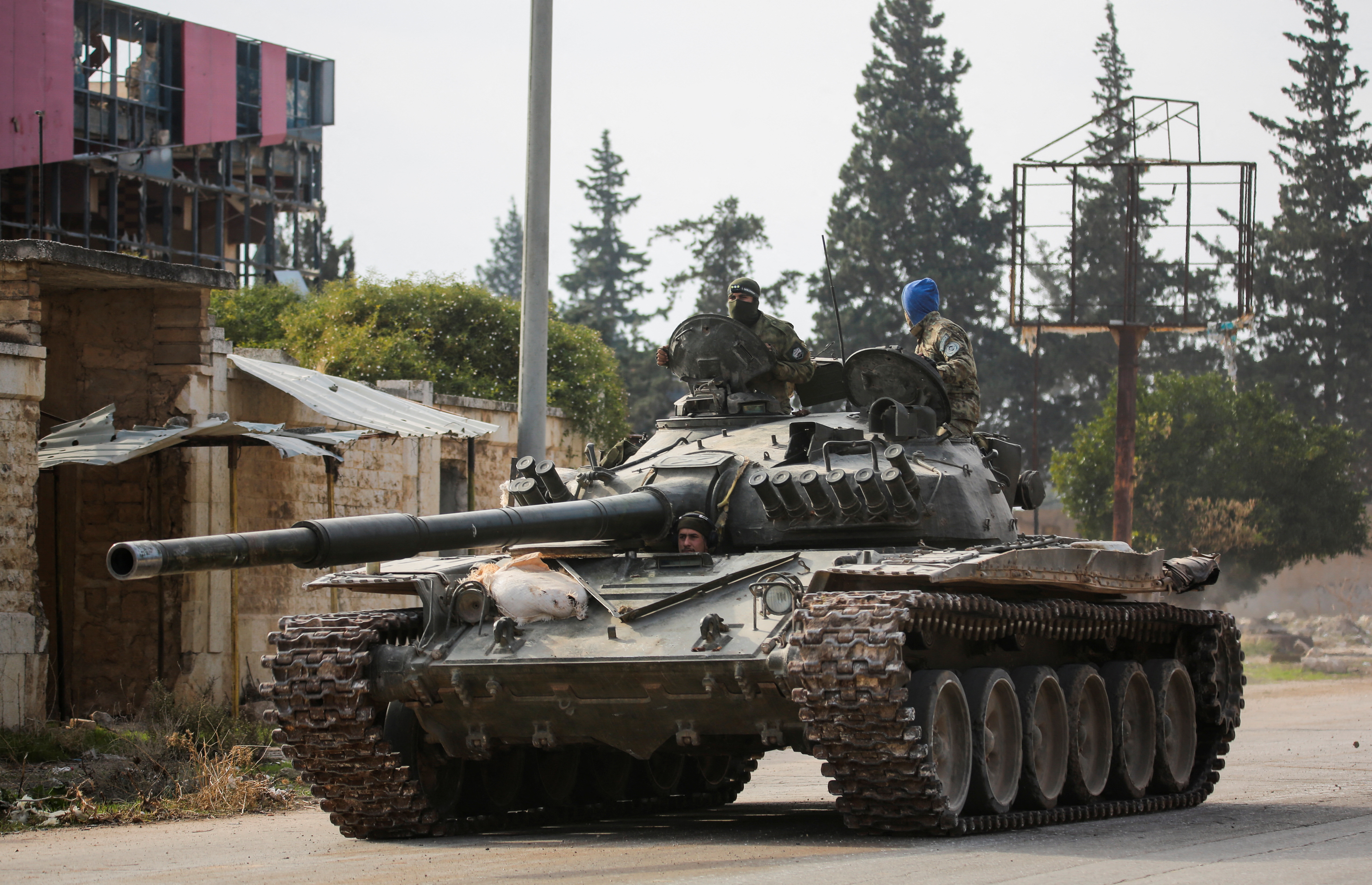 Rebels led by the Islamist militant group Hayat Tahrir al-Sham drive a military vehicle in al-Rashideen, Aleppo province, Syria November 29, 2024.
Rebels led by the Islamist militant group Hayat Tahrir al-Sham drive a military vehicle in al-Rashideen, Aleppo province, Syria November 29, 2024.
